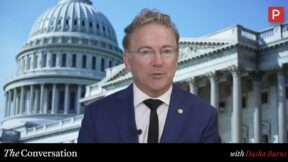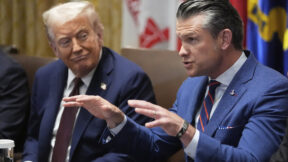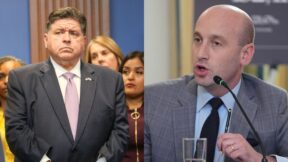Barack Obama Is Anything But ‘Our Neo-Conservative President’
The Obama White House has continued Bush’s counter-terror policies in many ways but, with few exceptions, his administration has neglected foreign relations.
The Obama administration squandered a once in a generation opportunity to advance regime change in Iran when the streets spontaneously erupted in anti-regime protests in 2009. In what would be a precursor to the Arab Spring of 2011, the Obama administration dithered and eventually did everything but outright declare their allegiance with the regime in Tehran as part of the new administration’s dedication to a negotiated end to the ongoing nuclear standoff. It was the hubristic embrace of their desire to embarrass the Bush administration’s approach to diplomacy that prevented Obama’s White House from leveraging those events to the good of the Iranian protesters and world. Today, Iran remains the globe’s predominant diplomatic crisis.
When the Arab Spring did erupt, eager to right their mistakes in 2009, the Obama administration embraced a schizophrenic policy of supporting some reformist and rebellious movements and ignoring others with little rule or reason. The U.S. supported the overthrow of Mubarak in Egypt (the shock of this betrayal has yet to abate in Israel). The successor regime still coalescing appears poised to overturn the peace established by President Carter at Camp David in 1979. To Cairo’s credit, they are refraining from allowing their populace to vote on the status of Egyptian-Israeli relations – no doubt, the Muslim Brotherhood’s own anti-Israeli propaganda would be reflected in the results of such a referendum.
In Libya, a nation where America’s interests are vague at best, Obama committed military resources to overthrow a regime hat had unilaterally disarmed in the last decade. Today, the successor regime is even more opaque and hostile to the West. In Syria, where America has vital and tangible diplomatic and strategic interests vis a vis Israel, America has sat on its hands while thousands of civilians are slaughtered. The political capital required to intervene was fully expended over the skies of North Africa.
In terms of our relations with the great powers — Western Europe, Russia and China — the U.S. is in not in better position than the end of 2008. The state of affairs is arguably far worse.
As Western Europe wrestles with an existential financial crisis that threatens the Eurozone experiment, the President has shown a willingness to allow institutions like the International Monetary Fund to underwrite an entitlement largess in the most indebted nations that has likely prolonged the suffering that would have been ameliorated by orderly default.
Russia, a resurgent and aggressively expansionist power that only four years ago mounted a cross-border invasion of the former Soviet Republic of Georgia, has engaged in the most repressive, anti-democratic crackdown over the last eight years that the state had seen since Brezhnev. Obama’s “open mic gaffe,” which has no doubt by now been transmitted to Vladimir, only serves to illustrate just how weak the president’s Moscow policy has been. Beginning in 2009 with the unilateral abandonment of radar and anti-missile installations in Eastern Europe, the president sent a signal to our Eastern European allies–perhaps the most stalwart allies America has next to Israel –that their security was merely a bargaining chip.
Obama has ceded to China the great advantage of holding billions of dollars of American currency and debt – a double edged sword for both nations. While they signal a new era of expansionism in the development of a blue water navy and is investing billions in future battlegrounds like South and Latin America and Africa, America retreats. Even non-security related battles like those over intellectual property rights have been all but conceded.
To Obama’s credit, or perhaps more appropriately to credit Sec. Hillary Clinton and her State Department, the administration has made strides and tangible progress in Burma. The repressive junta that governs that South Asian nation has thawed and responded positively to Foggy Bottom’s carrots and sticks approach. Democratic leader and galvanizing figure Aung San Suu Kyi is not free – but the regime is slowly opening. But this is a rare success.
Neo-conservative foreign policy was not merely consumed with counter-terrorism. There is a broad interstate component to such a foreign policy. The war on terror is fleeting. The dynamic that has been with us for all of human history is that of great power politics. It has been a feature of human existence since the dawn of tribalism, and was made quantifiable by the Peloponnesian conflicts which defined alliance structure and the dynamics of the zero sum game. The Obama administration’s views of great power politics have been a unique disaster that is not an election issue in 2012 only because the world’s economic stresses overshadow military threats. Obama’s White House has stewarded American supremacy and the “Pax Americana” that followed the end of the Cold War with a near flagrant disregard.
Martel identifies a commonly held belief among Obama’s far-left supporters that the president has not engaged in a policy distant enough from Bush to be substantial, so it could even be said to be identical. This is simply not the case – his is a progressive foreign policy, however one which still embraces concern for the safety and security of Americans today. But a neo-conservative critique of Obama’s foreign policy suggests that he has traded security today for strategic losses tomorrow. This is not an American foreign policy worth defending.
Pages: 1 2
This is an opinion piece. The views expressed in this article are those of just the author.




